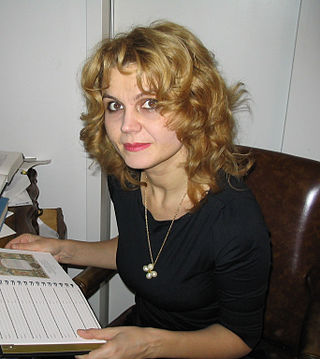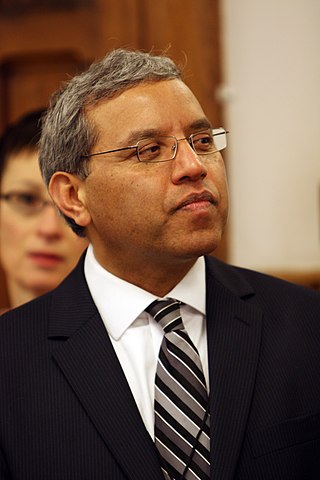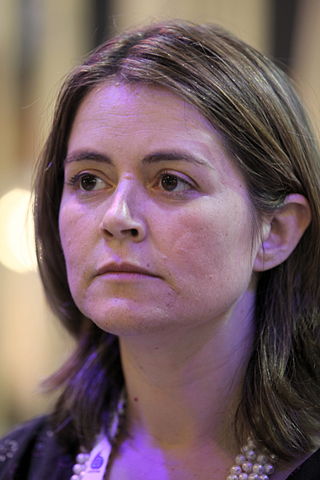Related Research Articles
After the fall of the Pol Pot regime of Democratic Kampuchea, Cambodia was under Vietnamese occupation and a pro-Hanoi government, the People's Republic of Kampuchea, was established. A civil war raged during the 1980s opposing the government's Kampuchean People's Revolutionary Armed Forces against the Coalition Government of Democratic Kampuchea, a government in exile composed of three Cambodian political factions: Prince Norodom Sihanouk's FUNCINPEC party, the Party of Democratic Kampuchea and the Khmer People's National Liberation Front (KPNLF).

The United Nations Human Rights Council (UNHRC) is a United Nations body whose mission is to promote and protect human rights around the world. The Council has 47 members elected for staggered three-year terms on a regional group basis. The headquarters of the Council are at the United Nations Office at Geneva in Switzerland.
The human rights situation in Cambodia is facing growing criticisms both within the country and from an increasingly alarmed international community. After a series of flagrant violations against basic human rights a feeling of incertitude regarding the direction the country is emerging, sometimes comparing the situation to a newborn Burma.
Human rights in Thailand have long been a contentious issue. The country was among the first to sign the UN's Universal Declaration of Human Rights of 1948 and seemed committed to upholding its stipulations; in practice, however, those in power have often abused the human rights of the Thai nation with impunity. From 1977 to 1988, Amnesty International (AI) reported that there were whitewashed cases of more than one thousand alleged arbitrary detentions, fifty forced disappearances, and at least one hundred instances of torture and extrajudicial killings. In the years since then, AI demonstrated that little had changed, and Thailand's overall human rights record remained problematic. A 2019 HRW report expanded on AI's overview as it focuses specifically on the case of Thailand, as the newly government of Prime Minister Prayut Chan-o-cha assumes power in mid-2019, Thailand's human rights record shows no signs of change.

Ahmed Shaheed is a Maldivian diplomat, politician and professor. On 24 March 2016, he was appointed for the sixth year running as the United Nations Special Rapporteur on the human rights situation in the Islamic Republic of Iran. Shaheed is also the Chairperson of the Geneva-based international human rights think-tank, Universal Rights Group, which was launched in January 2014. He now lives in England, as Visiting Professor of Human Rights Practice at the University of Essex.

Philip Geoffrey Alston is an Australian international law scholar and human rights practitioner. He is John Norton Pomeroy Professor of Law at New York University School of Law, and co-chair of the law school's Center for Human Rights and Global Justice. In human rights law, Alston has held a range of senior UN appointments for over two decades, including United Nations Special Rapporteur on extrajudicial, summary or arbitrary executions, a position he held from August 2004 to July 2010, and UN Special Rapporteur on extreme poverty and human rights from 2014-2020.
Vitit Muntarbhorn is an international human rights expert and professor of law at Chulalongkorn University in Bangkok, Thailand. Muntarbhorn was designated in September 2016 as the first UN Independent Expert on violence and discrimination based on sexual orientation and gender identity by the Human Rights Council before succeeded by Victor Madrigal-Borloz in 2018.

Martin Scheinin is an international law scholar who served as the first United Nations Special Rapporteur on human rights and counter-terrorism in 2005–2011. He was selected for this position after serving for eight years (1997–2004) as member of the United Nations Human Rights Committee, the independent expert body monitoring states' compliance with the International Covenant on Civil and Political Rights. While on the committee, he was known as a defendant of the rights of minorities and indigenous peoples and opponent of capital punishment, as well as the drafter of the committee's General Comment No. 29 on states of emergency.

Iulia Antoanella Motoc is a Romanian judge and international law expert, currently a Judge at the European Court of Human Rights and a professor at the University of Bucharest. Before beginning her service at the Court, she served as a Judge at the Constitutional Court of Romania. Motoc was UN Special Rapporteur for the Democratic Republic of the Congo and she chaired a number of international experts bodies and was Vice-President of the UN Human Rights Committee. On 1 October 2013, the Parliamentary Assembly of the Council of Europe elected Motoc a Judge of the European Court of Human Rights with respect to Romania. She received an absolute majority of votes cast by parliamentarians. Her nine-year term of office began on 18 December 2013. In August 2021, she was elected as a member of the Institut de Droit International. On 28 March 2023, following a selection process, she was chosen by the Romanian Government to be Romania's candidate for the post of Judge at the International Criminal Court.

The government of Belarus is criticized for its human rights violations and persecution of non-governmental organisations, independent journalists, national minorities, and opposition politicians. In a testimony to the United States Senate Committee on Foreign Relations, former United States Secretary of State Condoleezza Rice labeled Belarus as one of the world's six "outposts of tyranny". In response, the Belarusian government called the assessment "quite far from reality". During 2020 Belarusian presidential election and protests, the number of political prisoners recognized by Viasna Human Rights Centre rose dramatically to 1062 as of 16 February 2022. Several people died after the use of unlawful and abusive force by law enforcement officials during 2020 protests. According to Amnesty International, the authorities didn't investigate violations during protests but instead harassed those who challenged their version of events. In July 2021, the authorities launched a campaign against the remaining non-governmental organizations, liquidating at least 270 of them by October, including all previously registered human rights organizations in the country.
Nils Melzer is a Swiss academic, author, and practitioner in the field of international law. From 2016 until 2022, Melzer was the United Nations Special Rapporteur on Torture and Other Cruel, Inhuman or Degrading Treatment or Punishment. He is a professor of international law at the University of Glasgow. From 2011-2013, he was Swiss Chair of International Humanitarian Law at the Geneva Academy of International Humanitarian Law and Human Rights.

Christoffel Hendrik Heyns was a Professor of Human Rights Law, Director of the Institute for International and Comparative Law in Africa at the University of Pretoria and a member of the United Nations Human Rights Committee. He served as United Nations Special Rapporteur on extrajudicial, summary or arbitrary executions from 2010 to 2016. Heyns was a visiting professor at American University Washington College of Law's Academy on Human Rights and Humanitarian Law (2006–2012).

Surya Prasad Subedi OBE KC DCL LLD is an international jurist. He is Professor of International Law at the University of Leeds, a member of the Institut de Droit International, and a barrister in London. He also is a visiting professor on the international human rights law programme of the University of Oxford. He served as the United Nations special rapporteur for human rights in Cambodia for six years (2009-2015). He also served for five years, starting in 2010, on an advisory group on human rights to the British Foreign Secretary. In 2021, he was appointed legal procedural advisor to the World Conservation Congress of the International Union for Conservation of Nature held in Marseille, France. He has written a number of works on the theory and practice of international law and human rights and acted as a counsel in a number of cases before the international courts and tribunals, including the International Court of Justice. In 2022, he was appointed to the list of arbitrators under a post-Brexit free-trade treaty between the United Kingdom and the European Union - the Trade and Cooperation Agreement (TCA).

Agnès Callamard is a French human-rights activist who is the Secretary General of Amnesty International. She was previously the Special Rapporteur on extrajudicial, summary, or arbitrary executions appointed by the United Nations Human Rights Council, and the former Director of the Columbia University Global Freedom of Expression project.

David Kaye was the United Nations special rapporteur on the Promotion and Protection of the Right to Freedom of Opinion and Expression between August 2014 and July 2020. He was succeeded by Irene Khan. Kaye is clinical professor of law at the University of California, Irvine on public international law, international humanitarian law human rights and international criminal justice. He is co-director of the new UCI Fair Elections and Free Speech Center working at the intersection of technology, freedom of speech and democratic deliberation. He is also the independent board chair of the Global Network Initiative.
The United Nations Special Rapporteur on the situation of human rights in the Islamic Republic of Iran is a United Nations Special Rapporteur whose mandate is to monitor and investigate human rights violations in Iran. The current Special Rapporteur is Javaid Rehman. He is the sixth special rapporteur to Iran, following the tenures of Andrés Aguilar (1984–1986), Reynaldo Galindo Pohl (1986–1995), Maurice Copithorne (1995–2002), Ahmed Shaheed (2011–2016), and Asma Jilani Jahangir (2016–2018).

Rashida Manjoo is an Emeritus Professor at the University of Cape Town in Cape Town and a social activist involved in the eradication of violence against women and gender-based violence. Manjoo was the United Nations' Special Rapporteur on Violence Against Women from June 2009 to July 2015.

François Crépeau, is a Canadian lawyer and Full Professor at the Faculty of Law at McGill University, as well as a former Director of the McGill Centre for Human Rights and Legal Pluralism.

Catarina de Albuquerque is a Portuguese lawyer and human rights activist who served as the first United Nations Special Rapporteur on the right to safe drinking water and sanitation (2008–2014). After becoming Executive Chair of Sanitation and Water for All (SWA) in 2015, in September 2018 she was appointed SWA's Chief Executive Officer.
Yu Wensheng is a Chinese human rights lawyer based in Beijing. He is known for criticizing the Chinese Communist Party and taking up politically sensitive cases against the government.
References
- ↑ "Professor Rhona Smith". Newcastle Law School. Newcastle University. Retrieved 1 April 2019.
- ↑ "Rhona Smith". The Conversation. 19 October 2016. Retrieved 1 April 2019.
- ↑ "Special Rapporteur on the situation of human rights in Cambodia". United Nations Office of the High Commissioner on Human Rights. Retrieved 1 April 2019.
- ↑ "Human rights: New UN Special Rapporteur on Cambodia launches her first official country visit". United Nations: Office of the High Commissioner for Human Rights. 13 May 2015. Retrieved 1 April 2019.
- ↑ "CCJHR Annual Distinguished Lecture 2018: Professor Rhona Smith". Centre for Criminal Justice and Human Rights University College Cork. 4 December 2018. Retrieved 1 April 2019.
- ↑ Chheng, Niem. "Government hits back at Rhona Smith's UN comments, National, Phnom Penh Post". www.phnompenhpost.com. Retrieved 2 April 2019.
- ↑ "UN experts: Cambodian opposition leaders' jail terms 'appalling'". Toronto Star. 8 March 2021.
- ↑ Ruengchinda, Zazithorn (31 March 2021). "Thai scholar starts as UN Special Rapporteur on human rights in Cambodia". ScandAsia.
- ↑ Sokhean, Ben (31 March 2021). "Hopes pinned on new UN Special Rapporteur for human rights". Khmer Times.